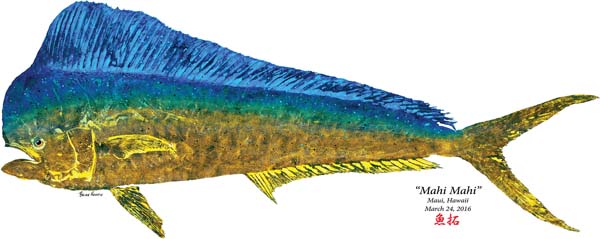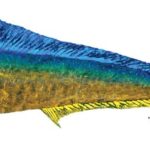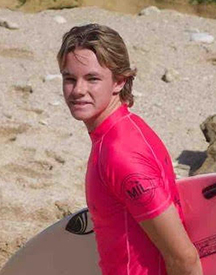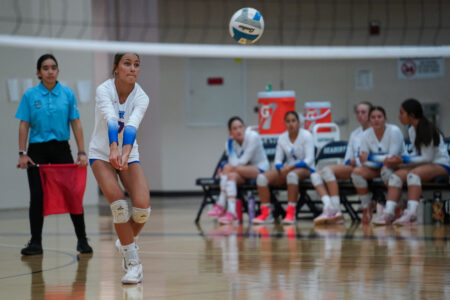Ocean inspires artists and others
KA MO‘OLELO MOANA

Gyotaku fish printing, a Japanese art form, has grown in popularity in Hawaii. “Mahi Mahi,” created by Brian Heustis of Maui Fish Printing. -- Maui Ocean Center photo
“I’ll never forget the first time I attempted to print a fish. It was not in the most ideal conditions, on a table in the main cabin of a snorkel boat. It was a mahi mahi, and when I peeled off the rice paper to look at what I created, I remember a feeling of pure joy, of finding a piece of myself I didn’t even know existed. From that moment, I knew fish printing would be in my life forever.”
When Brian Heustis moved from Aruba to Maui in the early 1990s, he eventually discovered an art form that was generally unknown by the rest of the United States. Like many artists before him, Brian experienced Hawaii’s unique fusion of cultures that brings together art styles from around the world. For those with a creative mind, Hawaii is an artist’s paradise and its pristine waters offer an endless canvass for artistic inspiration and expression.
Fish printing is generally known as gyotaku. Gyo, meaning fish, and taku, meaning rubbing, is a traditional Japanese art form that dates back to the mid-19th century. Long before the existence of cameras and smartphones, Japanese fishermen used gyotaku to document their catches. Today, it’s evolved into an art form that many of Hawaii’s fishermen use to create a keepsake of their most prized catch.
Although centuries have passed since its origin, gyotaku methods have largely remained the same. Fresh fish is blotted down to dry, a nontoxic ink or paint is lightly applied, and a thin piece of rice paper is placed over the fish and rubbed by hand. Once the paper is removed and the print captured, the artist chooses how to finish the piece — some prefer to keep it black and white while others utilize a palette of colors to bring the fish to life.
Hawaiians were no strangers to recording their ocean findings as well. Pi’i kohaku (stone carvings) is an ancient art form that serves as a connection to the history of the Hawaiian people. Wa’a (sailing canoe), lawai’a (fisherman), makua (fishhook) and various human and animal figures were among some of the images carved into stone. Pi’i kohaku were typically carved into smooth pahoehoe lava rocks, flat surfaces or round boulders.
Today, artists like Brian continue to perpetuate the island’s diverse cultural art styles that have become a part of Hawaii’s identity. “I feel extremely blessed to have made a choice to move to Maui,” said Brian, “My love and passion for the ocean is the core reason for expressing myself and nature through fish printing. Every fish I print is special, no matter how big or small. Each one has a story to tell and I consider it my honor to be allowed to tell it.”
Brian is now a full-time artist and owner of Maui Fish Printing. “I really care about the ocean and being a steward by exciting people through my art,” added Brian. “None of the fish I print are wasted.”
Because nontoxic materials are used, fish used in gyotaku are safe to eat. Brian also sells fish to local restaurants or donates them to Maui Ocean Center to feed the sharks. Brian also freezes fish to re-use them for multiple prints.
The beauty and wonder of our ocean remains a leading source of inspiration for not only artists, but for anyone who shares an appreciation for nature.
Thursday is World Oceans Day, a global celebration to recognize the beauty and importance of our ocean. On this day, Maui Ocean Center will host a World Oceans Day Art Walk in the Aquarium exhibits. Guests will have the opportunity to meet a number of Maui’s artists, including Brian, to learn about their story and view how their artwork is influenced by Hawaii’s marine life. For more information, visit mauioceancenter.com or call 270-7000.
* Evan Pascual is the marketing and public relations coordinator at Maui Ocean Center. “Ka Mo’olelo Moana,” or “the Ocean Story,” is a monthly column submitted by Maui Ocean Center staff members. The center is open from 9 a.m. to 5 p.m. daily in Maalaea. For more information, call 270-7000.
- Gyotaku fish printing, a Japanese art form, has grown in popularity in Hawaii. “Mahi Mahi,” created by Brian Heustis of Maui Fish Printing. — Maui Ocean Center photo





